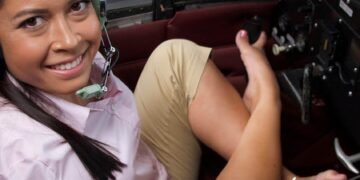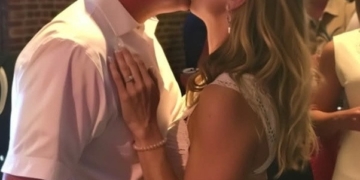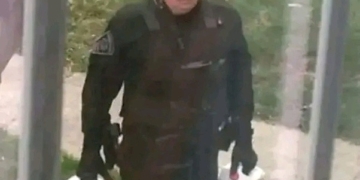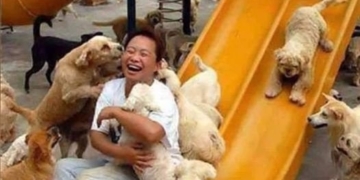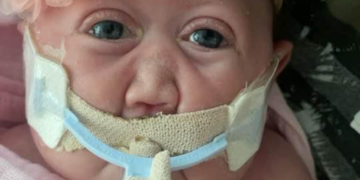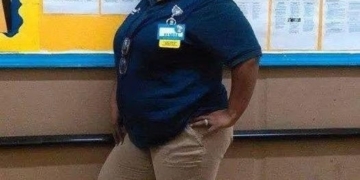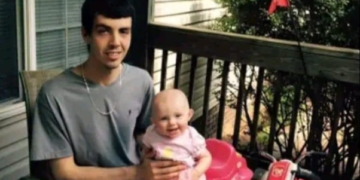After my grandmother passed away, my grandfather made a quiet decision that surprised many in the family. He chose to remain in the home they had shared for decades, alone. Despite the many offers from relatives to come live with him or have someone move in, he politely declined every single one. He wasn’t being stubborn, just deeply set in his ways and perhaps needing space to grieve on his own terms. We all worried, of course. The silence of a house that was once filled with shared memories and companionship can be a heavy one to bear.
Watching him from afar, I felt an ache that wouldn’t go away. I couldn’t stop thinking about how lonely he must be. Then one day, I came across a small, scruffy dog wandering the streets—lost, hungry, and clearly without a home. There was something about the dog that stopped me in my tracks. He wasn’t just another stray. His eyes carried a story, a quiet resilience, maybe even a longing. I took him in without hesitation, cleaned him up, and brought him over to my grandfather’s house.

He opened the door, gave the pup a curious look, and after a few minutes of tentative sniffing and gentle pats, they both seemed to relax into each other’s presence. My grandfather named him Chirulin, without even thinking twice about it. From that day forward, something shifted. The house no longer felt empty. Chirulin quickly became a part of the rhythm of my grandfather’s daily life. They shared meals—yes, even from the same bowl at times. They napped together in the patch of sunlight that came through the living room window. They watched television in the evenings, side by side on the couch. They had found a kind of harmony, a quiet understanding that didn’t need many words.
A few days ago, however, that peaceful routine was interrupted when my grandfather suddenly fell ill. It wasn’t anything we had seen coming. He was rushed to the hospital, and for the first time in a long while, Chirulin was alone. I stayed with the little dog, trying to comfort him, but I could see he was lost without his companion. His ears perked up at every sound, his eyes constantly searched for a familiar figure that didn’t appear. The house was quiet again, but this time, it felt heavier.
While my grandfather was in the hospital, he wrote me a letter. He didn’t speak much when we visited, but he made sure to pass along that envelope. Inside, I found a note written in his careful, neat handwriting. It was all about Chirulin—how to care for him, the exact steps for making his favorite soup, the time he liked to go on walks, even the lullaby he sometimes hummed to help him fall asleep. Every line was filled with love and worry, not for himself, but for his friend.
Reading that letter was like having my heart cracked open. I sat on the edge of my bed, the paper trembling in my hands, tears falling onto the ink. All I could think was: I wish he could write me instructions on how to live without him too. There was so much tenderness in that letter, and so much preparation for the possibility of goodbye. He even asked our entire family to look after Chirulin if he didn’t make it. That one sentence carried more weight than I could have imagined.
Thankfully, he pulled through. After a few days, he was released from the hospital and came back home. I brought Chirulin to him, not knowing what to expect. But the moment they saw each other, it was like time stood still. Chirulin leapt into his arms, tail wagging furiously, and my grandfather held him close, eyes brimming with emotion. Then he leaned down and whispered, “We’ve got to get moving—we still have so many things left to do together.” And then he laughed, a deep, joyful sound that filled the room and lifted something inside all of us.
Later that evening, he showed me a list. A real list, scribbled in the margins of an old notepad. It was a list of adventures and quiet moments he wanted to share with Chirulin—another beach walk, a road trip to the hills, one more night under the stars, maybe even a birthday party with dog-friendly cake. Some of it was whimsical, some practical, but all of it was deeply human. His days now had purpose again, colored by the presence of this little creature who had unknowingly saved him from his solitude.
And when you look at Chirulin, especially when he gazes up at my grandfather, it’s as if he knows. There’s an unmistakable bond between them, one that goes beyond pet and owner. It’s a connection forged in silence, shared loss, and quiet joy. It’s not the kind of thing that can be easily explained, but it’s real. You feel it in the way they move through the day, each attuned to the other.
There are people who might look at this story and say, “It’s just a dog.” But those people have likely never experienced the healing power of an animal’s companionship. Animals, especially those we choose to bring into our lives, have a way of softening us. They teach us things we often forget in the chaos of being human. Patience. Empathy. Presence. They teach us to sit still, to listen, to notice the small things. To celebrate the now.
Chirulin didn’t just give my grandfather company. He gave him purpose. A reason to wake up in the morning. A routine. A heartbeat in the room that reminded him that he was not alone. And in return, my grandfather gave Chirulin something just as important—a home, love, security, and the quiet promise that he would never be abandoned again.
It’s easy to overlook these small, everyday stories of love and connection. But they’re often the ones that matter most. They remind us that healing doesn’t always come in grand gestures or dramatic breakthroughs. Sometimes, healing looks like a bowl of soup carefully made for a tiny friend. It looks like a handwritten note filled with care instructions. It looks like a laugh after a scare, or a whispered promise in the middle of a hug.
Animals bring us back to ourselves. They mirror our emotions, sense our fears, and sit with us in our grief without needing to fix it. They don’t need explanations. They just stay. That kind of companionship is rare and precious. It doesn’t replace human love, but it adds a layer of comfort that is hard to describe until you’ve felt it for yourself.
My grandfather and Chirulin are growing older together now, step by step, walk by walk. And each day they share is a quiet victory against the loneliness that once threatened to swallow the house whole. Watching them, I’m reminded that sometimes the smallest lives carry the biggest light.
To love an animal is to allow your heart to open in ways it never has before. And to be loved by one? That is a kind of grace we should never take for granted.





















